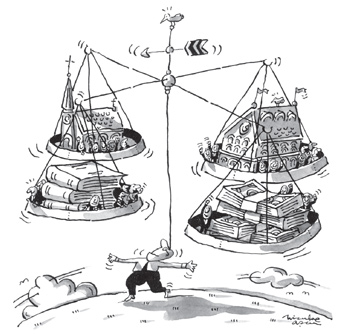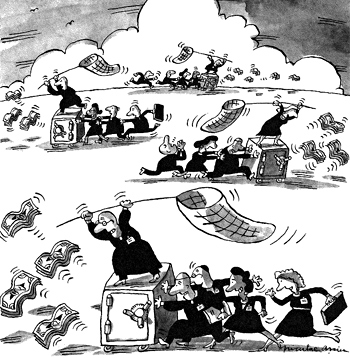When Asbury Theological Seminary’s board forced its president to resign in late 2006, it couldn’t have been at a worse time. The rapidly deteriorating economy made the usual challenge of finding a new president even harder, said Dan Johnson, chair of the board’s search committee.
Johnson was looking for more than just a great résumé. Instead, he wanted to find someone with the character to build a strong team and develop the school’s constituencies. When they hired missions professor Timothy Tennent, Johnson said, the committee found even more than what it was looking for.
According to a new study, Johnson’s impulse was a good one: His preferences for the Asbury search match those that have been determined to be essential to great seminary presidents.
Personal qualities -- rather than experience or training -- were the best predictors of success, according to “Leadership That Works,” a four-year study by a team of researchers led by Barbara Wheeler, former president of Auburn Theological Seminary and director of the school’s Center for the Study of Theological Education.
Researchers surveyed seminary presidents, academic deans and financial officers, and built on previous surveys of seminary leadership by the Auburn Center. They visited six well-run schools and followed for three years the newly appointed presidents of 10 more. The study covered a broad range of institutional types -- Roman Catholic, mainline and evangelical Protestant, denominational and independent, large and small, financially secure and financially stressed.
A great seminary president
The single most significant finding of the study was that success comes from the ability to determine what tasks need to be done and the character required to do those tasks, Wheeler said.
“Presidents need to decide what the job requires and do that, rather than the parts of the job they’re good at or feel good doing,” Wheeler said. “Discipline, self-management and a clear picture of what the job requires -- that is the key ingredient of success.”
Although search committees typically focus on candidates’ résumés, that is misplaced, the study said.
“There is no correlation between résumé and presidential success,” the study said.
There is no single path to the role of president at a seminary. Some candidates come directly from the classroom, others from administration, others from the pastorate. Still other candidates may come from the nonprofit world or another seminary. Yet people from all fields have become successful in the role, while people with similar résumés have also failed.
“Experience in the kinds of functions that presidents are expected to perform would seem to be desirable,” the study noted, “but this study did not prove that presidents who had previously managed staff or raised funds in other settings necessarily do that work better when they become the head of a seminary than those with little or no practice at those tasks.”
Success at seminaries may look quite different depending on the nature of the school, its denominational affiliation, its size and other factors. For the study, Wheeler and her colleagues defined success as “leadership that creates the conditions for institutional stability, productivity, and creativity.”
Wheeler offered three broad generalizations when defining success: First, the institution should be stable. The future of the school will be as strong as the present. Second, it should have “good relationships with whomever it depends on for well-being,” Wheeler said. Whether those relationships are with donors, university administrations or denominational executives, they ought to be healthy. Finally, Wheeler said, “the institution should be aligned enough with its mission that it is capable of change as circumstances change.”
What is required of a president to achieve those goals? The survey found four characteristics of those people who did well:
Personal strength. This includes “powerful intelligence, confidence, persuasiveness and persistence,” but the study found that it is also essential to have “firmness and the capacity to withstand criticism.”
Humility. A willingness to seek constructive criticism is important in leaders, who must have “a mature capacity to put other priorities ahead of their personal need for approval or deference.”
Interpersonal skills. “The presidents who have staying power,” the study found, “have the capacity to pay attention to other people, to form relationships with them, and to sustain and deepen those relationships through thick and thin.”
Discipline. This is an especially important trait, because seminary presidents come from a variety of backgrounds. Because their personal strengths are not necessarily a perfect match with the institution’s needs, “effective presidents do what the job requires in proportions that best meet the needs of the institution rather than emphasizing tasks that give them the most satisfaction.”
Doing the right things
The biggest challenge a president will face is deciding what most needs to be done.
Daniel Aleshire, executive director of the Association of Theological Schools, said: “There’s more in the president’s job than can be done. They’re always doing triage, but are they doing triage on the right things?”
This is why personal qualities are more important than credentials. “Their task is focused on constituency development, funds development, public leadership,” Aleshire said, “but they’re scholars, and they want to write.” While writing books or preaching in churches is important, he said, and may fit within the president’s job, it’s not related to making payroll.
“Having interviewed every new president [of an ATS school] for the last 13 years, those who seem to have done well are people committed to the work of the school; they understand it, and they develop a focus on getting good at that work,” Aleshire said.
Presidents must cultivate something like an ascetic practice to do those things that are difficult for them. The study authors say the role requires paying attention to a “discomfort zone.” Those areas that are a challenge and that provide little pleasure are often the ones that need the most attention.
The Auburn Center study found five core practices that all seminary presidents must be able to develop skill in executing:
Team building. Presidents must add, subtract and develop members of a team that is able to implement the executive’s vision effectively and complement his or her skills. Ideally, the team would be able to continue functioning without the president’s direction.
Faculty relations. Successful presidents honor and respect their faculties’ views and accomplishments. They must have the overall support of the faculty, but opposing the faculty’s wishes at times will be necessary.
Financial management. According to the study, “the best of the presidents we observed imposed fiscal discipline during their first year, if the institution’s finances were out of balance, and insisted that it be maintained in every subsequent year.” Many seminaries are in financial difficulty. An analysis by the ATS found that two-thirds of free-standing seminaries were in the red before the beginning of the recession in December 2007. Financial weakness can harm seminaries’ missions and cripple them over the long term.
Institutional advancement. After making any necessary internal changes, it is important for a president to turn his or her attention to outside constituencies. “Money is not usually a problem of money but a problem of constituency,” Aleshire said. The study found that while new presidents spent 51 percent of their time focusing on the internal workings of the school, that shifted to just 18 percent as their presidency matured. Making the case to external audiences, particularly those able to provide financial support, is essential but rarely a task new presidents have experience doing. Still, the study found that those new presidents who applied themselves to cultivating external relationships were soon successful.
Vision. This gives direction to all the other responsibilities of the president. “The president’s job is not to supply a vision,” according to the study, “but to discern one that is rooted in the school’s heritage, alert to the needs of the church and the world, and expressive of high aspiration for the future.” The president must then communicate that vision and motivate internal and external constituencies to make it happen.
Demands of the times
Richard J. Mouw has spent 17 years as president of Fuller Seminary, which has 4,000 students. Mouw transitioned to the presidency after 25 years in the classroom and four years in administration. He said that seminary presidents today are especially important during a period of transition in theological education.
“I worry that we’re not ready with the kinds of presidents we need,” he said.
A new generation of students receives and processes information in new ways, said Mouw, who is now serving a term as president of the ATS. In addition, seminaries must contend with “the decline of major denominations and the growth of congregations that do not respect theological education,” he said.
In this new environment, Mouw said, “seminaries need to think about what it means to be a seminary to serve the church.” And it’s essential to be developing leaders who are able to meet this new situation.
“I’m not sure we’re ready to face these challenges,” Mouw said. “Intellectual, theological and visionary leadership is required like never before.”
In addition to certain personality characteristics and the basic job requirements, a good seminary president must embody the fundamental religious vision of the school, said Aleshire, of the ATS. “Some presidents who do the best are good at their tasks, but they are also the icon of what the school is religiously about.”
Aleshire said Joseph Hough played that role at Union Theological Seminary during his tenure from 1999 to 2008. “Hough reflected the vision of what Union is about, and he embodied the statement of what the school could be and has done.” The author of several books on theology prior to his presidency, Hough raised $30 million in support of Union while at the helm of the seminary.
The presidency is a tough role to fill at a seminary, said Auburn’s Wheeler. “Not many people are hankering to do this work,” she said. “Your reward will be great in heaven.”
And Mouw notes that the best presidents never seek out the job. “That may be a good characteristic,” he said.
However, seminaries can promote future leaders, and people can support the work of seminary presidents by aspiring to leadership roles among alumni, board, faculty and staff, Wheeler said.
The important thing is to nurture people who believe in the work of theological education and are willing to use and develop their skills for the benefit of a seminary. “People should think more institutionally and be able to help with those areas of leadership,” Wheeler said. “It would be a great thing if people aspired to leadership in seminary education.”















